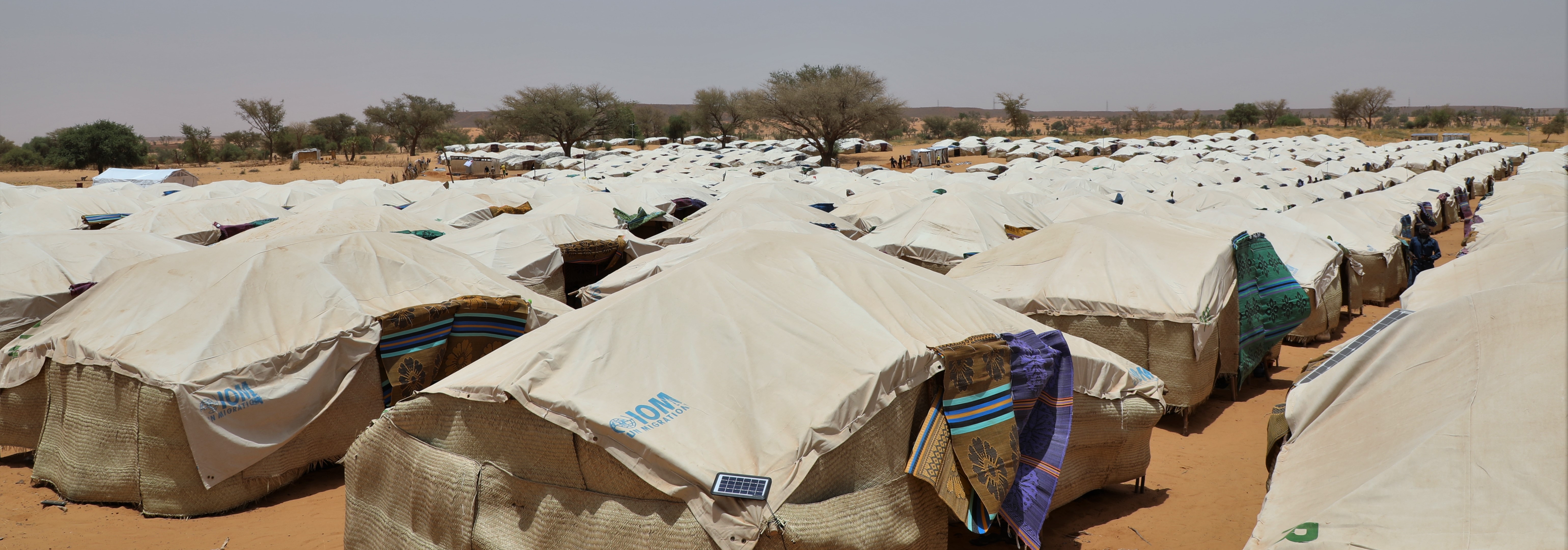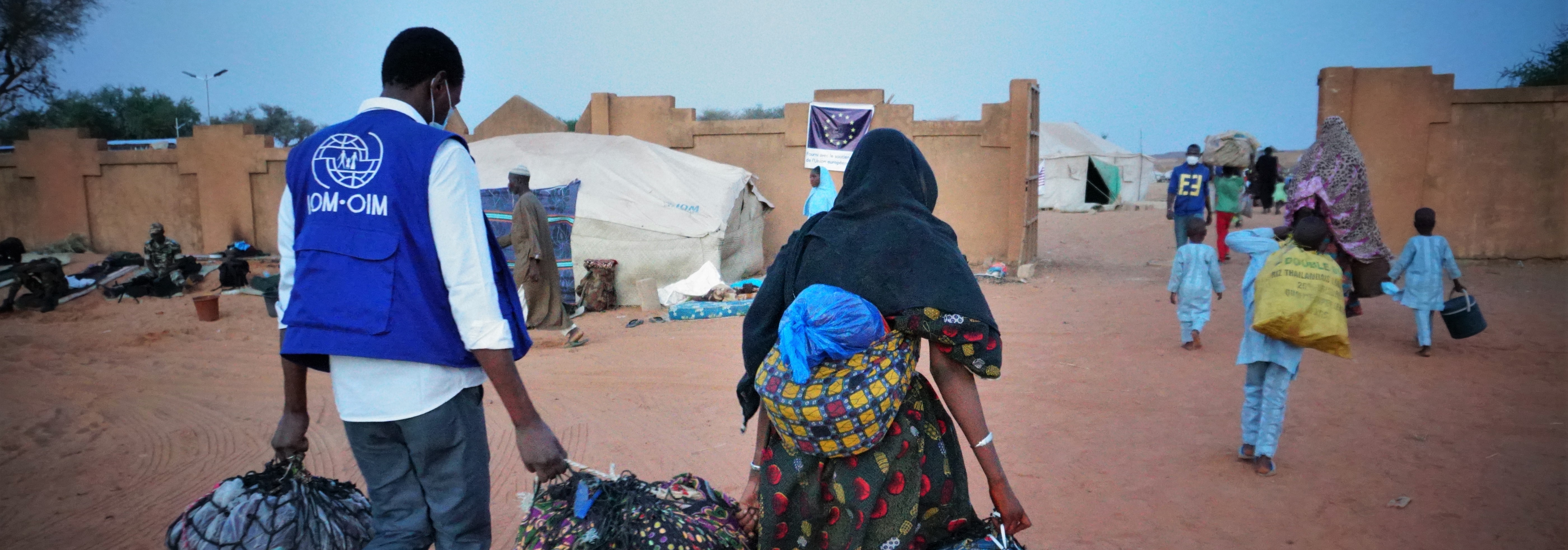IOM Vision
In Niger, IOM seeks to provide lifesaving assistance to crisis-affected populations in the southern regions of Niger, vulnerable Nigerien migrants in need of support within Niger or stranded abroad, as well as to foreign migrants who are stranded in Niger and have expressed the desire to return to their countries of origin, complemented by peacebuilding and social cohesion efforts to promote stability and peaceful coexistence between host communities, IDPs and migrants. IOM envisions to scale up its current levels of assistance in areas that have been affected by crisis, including natural disasters and armed conflict, and supports the enhanced resilience of communities to withstand future shocks.
Objective
Saving lives and protecting people on the move
Vulnerable individuals affected by displacement (IDPs, refugees, returnees and communities) resulting from insecurity or natural disasters will be targeted for direct assistance. These individuals already living in situations of poverty are considered vulnerable without compounding their situation with displacement or increased pressures on limited natural resources and basic social infrastructure. Migrants in Niger, principally in the region of Agadez, after being expelled from Algeria or those who find themselves stranded and abandoned by their smugglers, will be offered humanitarian and voluntary return assistance to return to their countries of origin.
In order to meet the basic needs, including food, of the affected population, IOM Niger will:
- Assist vulnerable, stranded migrants in its six transit centres throughout the country (one in Arlit, Agadez and Dirkou, three in Niamey). The majority of the migrants that receive assistance in the transit centre arrive after being expelled from Algeria. The other migrants arrive either after being rescued by IOM in its Search and Rescue operations in the northern Agadez region along the route to Libya, or by their own means.
- Provide food assistance three times a day and drinking water all day to migrants during their stay in the transit centres. Migrants stay in IOM’s centres for an average of two weeks, depending on their vulnerabilities and countries of origin.
|
In 2021, IOM will continue to assist conflict-affected populations in the regions of Diffa, Tahoua, Tillabery and Maradi. Assistance will be in-kind and will be provided to 8,000 households and will include the following:
To enable vulnerable affected households to procure necessary material to repair their houses, IOM Niger will provide in-cash assistance to:
|
|
IOM will provide mental health and psychosocial support services for migrants in distress stranded in Niger, as well as for crisis-affected populations, to enhance their well-being and strengthen their resilience before their return to their country of origin. It will do so through the following:
|
To ensure that conflict-affected populations in the regions of Diffa, Tahoua, Tillabery and Maradi can adopt the sanitary and hygiene measures that are paramount in the fight against COVID-19 (and other diseases), IOM will provide:
- Critical WASH support to displaced communities, which includes access to handwashing stations and soap;
- Assistance in the construction of 3,000 household latrines in support of the e-shelters and 100 gender-segregated communal latrines in schools, hospitals and other public spaces;
- Sensitization activities (to be carried out in line with national COVID-19 measures) and include such preventative items in its NFI kits as part of IOM’s support of the national COVID-19 response.
IOM aims to build on its strong collaboration with the Government of Niger at the national (Ministry of Public Health) and regional (Regional Directorate for Public Health, DRSP) level through the following:
- Continuing its evaluation of the current state of emergency health assistance. This will improve access to and the quality of healthcare for all populations in the targeted area of intervention;
- The provision of medical assistance (e.g. counselling, medicines or supplies) in displacement sites in the regions of Tillabery, Tahoua, Maradi and Diffa, including support to local health authorities with access to these displacement sites;
- Intensified medical support to migrants who are expelled from Algeria, whose needs in this regard have increased as a result of the COVID-19 pandemic, including but not limited to quarantine measures, infection prevention and control measures in the transit centres.
|
After being expelled from Algeria or being stranded in Niger, international migrants have the possibility to avail of IOM’s humanitarian movement assistance to voluntarily return to their countries of origin. For 2021, IOM plans to facilitate the following:
|
|
70% of the migrants who are returning to their country of origin do not have valid travel documents, a number that has been increasing as migrants returning from Algeria often do not have travel documents. For those cases, IOM Niger:
|
|
With regards to the protection of the most vulnerable migrants, IOM Niger plans to provide the following assistance that will focus on:
|

Objective
Driving solutions to displacement
IOM will work to improve social cohesion in the regions of Agadez, Diffa, Tillabery, and Tahoua, targeting local communities, including authorities, women and youth, as well as IDPs and refugees, as relevant to the social cohesion and stability needs. IOM will also seek to strengthen the social contract between authorities and communities. IOM further seeks to support the resilience of host communities and migrants in the Agadez region. In 2021, IOM proposes the development of a specific component targeting the most vulnerable migrants, refugees, IDPs, returnees and host communities to ensure access to medical care.
|
IOM supports communities’ (host communities and migrants) resilience with a far-reaching “people-driven” infrastructural programme in the Agadez region through the following activities:
|
|
IOM’s “Niger Community Cohesion Initiative (NCCI)” Programme implements activities in the Diffa, Tahoua and Tillabery regions that contribute to community stabilization, through enhancement of social cohesion and local governance, in conflict-affected localities. In 2021, these activities will contribute to the following outcomes:
|
|
Building on its ongoing efforts in the Agadez region, IOM will:
|
|
Building on the achievements attained during the COVID-19 response, IOM wishes to:
|
Objective
Strengthen preparedness and reduce disaster risk
|
IOM Niger will target Nigerien authorities for capacity-building activities to strengthen their disaster risk preparedness, especially in the Diffa, Tahoua, Tillabery, Marady, and Niamey region. Because of their key function in providing those services, IOM Niger’s interventions will specifically target the Ministry of Humanitarian Action, Ministry of Public Health, the Regional Security Councils, and the Directorate for Territorial Surveillance (DST, French acronym). IOM Niger plans to undertake a more detailed needs assessment to determine the number of individual beneficiaries that will be targeted for each governmental authority. |
|
IOM Niger will build upon its efforts to seek to promote integrated border management in Niger through the following:
|
|
With regards to emergency preparedness, IOM Niger will focus on:
|
|
IOM will strengthen the MHPSS technical working group and support MHPSS inclusion in the emergency response in Niger, by:
|
In 2021, IOM will implement:
- Community preparedness and risk reduction activities in response to natural or man-made disasters;
- Flood and drought response plans will be activated in many communes and ad hoc infrastructure such as water harvesting structures, run-off mitigation dams, and protection shelters, will be implemented through in-kind provision accompanied by capacity building of the targeted communities.
Objective
Contribute to an evidence-based and efficient crisis response system
|
Sharing borders with seven countries, most of them affected by internal crises, effective and evidence-based border management is essential for the Government of Niger. Coordination is sought with the regional authorities and communities living in the border areas to ensure that communities understand the role of border authorities and can refer to them in case any issues arise. IOM provides the Government of Niger and national and international partners, with up-to-date information about migration flows and patterns in Niger. In addition, information and data will be shared regarding the transhumance patterns in the tri-border area with Mali and Burkina Faso. |
|
IOM will implement the Displacement Tracking Matrix (DTM) through seven Flow Monitoring Points (FMPs) and ten Information Points (IPs) along the southern and northern regions to track migration trends and movements through Niger from/to neighbouring countries, including to/from Algeria and Libya. The following activities will be implemented:
|
Niger
The map used here is for illustration purposes only. Names and boundaries do not imply official endorsement or acceptance by IOM.
Figures are as of 31 December 2023. For more details of IOM's operational capacity in country, please see the IOM Capacity section.















